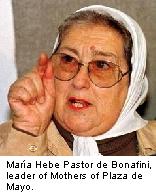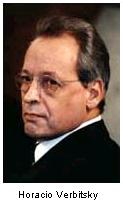| current issue |
| gay mundo |
| bush plus |
| race/class |
| nyc |
| africa |
| americas |
| asia |
| europe |
| arts series |
| gully español |
| about us |
| contact us |
| submit |
| subscribe |
| letters |
| archive |
| action resources |
| search |

"Anthrax psychosis" had been sweeping Argentina with a vengeance since mid-October.

Related Gully Coverage
Bush Friend Arrested
Dirty Money, Big Banks and the Mafia State
WTC Attack
Argentina: Menem charged with illegal arms trafficking.
Argentina's widening money-laundering scandal. Includes the Bush connection.
Guide to the Sept. 11, 2001 terrorist attacks. Includes info on Islam, Afghanistan, terrorism.

The trial begins for the 1994 car bombing of a Buenos Aires Jewish community center that left 86 dead, 300 wounded. Enrique Marcarian
by Juan Pérez Cabral
NOVEMBER 9, 2001. Argentinians woke up this week to more bad news from abroad: Wall Street was not buying the massive, de facto debt default their government was trying to peddle as a "debt swap."
Top bond-rating agencies, refusing to take the semantic bait, stuck to the old if it walks like a default and sounds like a default, then it's a default. Fitch, Inc. dropped Argentinian bond ratings to junk level, Standard & Poor's declared the country in "selective default," and the more circumspect Moody's Investors Services said the scheme had the "characteristics" of "a default event."
 The default label, which some feared could trigger a monumental run on Argentinian banks, knocked off anthrax from its perch as most ominous foreign import. "Anthrax psychosis" had been sweeping Argentina with a vengeance since mid-October, when a travel brochure mailed from Miami to a Buenos Aires family initially tested positive.
The default label, which some feared could trigger a monumental run on Argentinian banks, knocked off anthrax from its perch as most ominous foreign import. "Anthrax psychosis" had been sweeping Argentina with a vengeance since mid-October, when a travel brochure mailed from Miami to a Buenos Aires family initially tested positive.
Within hours, frantic citizens swamped police stations, hospitals and all kinds of government offices throughout the country with about 1,000 pieces of suspicious mail, most of them posted from the United States or Pakistan. None of the hundreds checked so far has tested positive and no one has been infected. Health officials said a second test of the travel brochure found the anthrax spores to be harmless, similar to those used in anthrax vaccinations for livestock. The anthrax hysteria, which has now abated, was clearly fueled by intense anxiety about the disintegrating economy — some commentators even wonder in print if Argentina may not be, after all, a failed state, not just economically, but also politically.
Fear of anthrax brought home a global "war on terrorism" that until then seemed remote to the average Argentinian, even if its economic repercussions could strike a killer blow to their ailing economy, now entering its 41st month of brutal recession.
Public reaction in Argentina to the September 11 attacks on New York and Washington was subdued. Politicians and the media made the right noises of commiseration in the immediate aftermath. The word "empire" was bandied about in the media, but not in an overly rancorous way — a truism rather than an epithet. The World Trade Center and the Pentagon were invariably referred to as "symbols" of the economic and military power of said empire (or sole superpower, or most powerful country in the world). That the World Trade Center was also a place where tens of thousands of small lives were lived, a real place in a real neighborhood, in a real city, generally got lost in the abstraction shuffle.
Overall, there was surprisingly little depth or sense of reality in most of what was written and said about the attacks. Perhaps it was the geographical and emotional distance — Buenos Aires is 5,276 miles away from the World Trade Center, where only two Argentinians were killed — or a reticence to offend a wounded U.S., or self-absorption, made even more acute by an intractable national crisis.
Two exceptions to the prevailing reticence were a noisy outburst by a bunch of students at the School of the Humanities of the University of Buenos Aires, who cheered the attacks, and a bitter public feud between two prominent human rights activists, the journalist Horacio Verbitsky and María Hebe Pastor de Bonafini, the leader of Mothers of Plaza de Mayo.
 At a recent teach-in organized by her group, Bonafini said that she was in Cuba on September 11 and had rejoiced when she heard about the attacks against the World Trade Center. "I'm not going to be hypocritical: I didn't feel bad at all," she said. "It made me happy."
At a recent teach-in organized by her group, Bonafini said that she was in Cuba on September 11 and had rejoiced when she heard about the attacks against the World Trade Center. "I'm not going to be hypocritical: I didn't feel bad at all," she said. "It made me happy."
The attacks had "avenged the blood shed by so many," she said. "In those two towers was decided who among us would die, lose their jobs, be massacred, be bombed," she added. "The fear that they instilled in us, with the persecution, with the disappearances, with the torture, is now being experienced by the entire American people. The people who remained silent and applauded the wars."
Bonafini's two sons were among the 15,000 to 30,000 "desaparecidos" or "disappeared," mostly left-leaning intellectuals, students, and union members kidnapped by Argentina's military government during the "dirty war" years (1976-1983) and never seen again. Mothers of Plaza de Mayo was founded in 1977 to find out what happened to them and see justice done. At the teach-in, she compared the World Trade Center attackers to "our children" who "were also called terrorists, but were revolutionaries" and "gave their lives for a better world."
Verbitsky slammed Bonafini for her selective humanitarianism, and noted that in recent years she had called "fascist" the Spanish democratic system for its response to the Basque terrorist group ETA, and those who say the Colombian guerrillas, and not just the U.S.-backed army, have violated human rights. "It's true that there are some people who have half of their feelings atrophied, experiencing a pity for the dead at the towers that they didn't have for the many victims of U.S. military power. But a person is not made more whole by a paralysis of one side, rather than of the other," he said in a column published on October 11 in the Buenos Aires daily Página 12, where he is a regular contributor.
Bonafini quickly shot back in an interview with the magazine 3 Puntos: "Verbitsky is a servant of the United States. He gets a salary from the Ford Foundation and, on top of being a Jew, he's totally pro-American." She later denied the anti-Semitic slur, but the magazine, which provided Verbitsky with an audiotape of the interview, stood by the quote.
 Verbitsky retorted that the only truth in Bonafini's accusations was "that I'm Jewish." He had both publicly condemned the September 11 attacks and, like 75 percent of Argentinians recently polled, opposed the U.S. bombings in Afghanistan.
Verbitsky retorted that the only truth in Bonafini's accusations was "that I'm Jewish." He had both publicly condemned the September 11 attacks and, like 75 percent of Argentinians recently polled, opposed the U.S. bombings in Afghanistan.
His commitment to a number of progressive causes over the years had been, among other things, precisely due to the fact that he was Jewish. Bonafini's anti-Semitism, while "not exceptional in Argentinian society, or in my own experience," was nevertheless "more serious" than that of a powerful banker like Raúl Moneta, accused of money-laundering, or the Army Chief, Ricardo Brinzoni, who earlier this year employed a neo-Nazi leader as his senior attorney. Unlike Bonafini, they at least didn't present themselves as "socialists and revolutionaries," concluded Verbitsky.
The Bonafini-Verbitsky duel, as emblematic of Argentina's current plight as the anthrax hysteria and the economic meltdown, took place while twenty people were finally being tried in Buenos Aires, charged with helping terrorists blow up a Jewish community center in 1994. Eighty-six people were killed and 300 wounded. Several of the accused are police officers.
Related links:
For Paul Krugman's A Cross of Dollars, on an Argentina crucified "on the altar of a discredited monetary theology." New York Times (Registration required).
For the Washington Post's A Destitute Argentina Suffers describing the effects of the bankrupt state health insurance system.
For Justice Delayed In Argentine Attacks, about the Jewish community center bombing trial. Washington Post, September 25, 2001.
For Horacio Verbitsky's two columns in Página 12 (Spanish only): La alegría de la muerte and Ser judío.
For Hebe de Bonafini's interview with the magazine 3 Puntos (Spanish only) and for her denial of anti-Semitism in the Madres de Plaza de Mayo site. (Spanish/English/German)
For Dirty Money, Big Banks and the Mafia State
For Complete Coverage WTC Attack
For Complete Coverage Americas
 WTC Attack
WTC Attack
 Guide to the Sept. 11, 2001 terrorist attacks on NYC and DC. Includes info on Afghanistan and the Taliban.
Guide to the Sept. 11, 2001 terrorist attacks on NYC and DC. Includes info on Afghanistan and the Taliban.
![]()
New World
![]() Our Americas. News, opinion, politics, democracies, failed utopias, and the sullen heirs of colonialism: from Canada to Argentina.
Our Americas. News, opinion, politics, democracies, failed utopias, and the sullen heirs of colonialism: from Canada to Argentina.
![]()
Bush Plus
![]() All about the morass of U.S. politics, George W. Bush, Dems, Greens, GOPs, activists, silently irritated masses and global impact.
All about the morass of U.S. politics, George W. Bush, Dems, Greens, GOPs, activists, silently irritated masses and global impact.
![]()